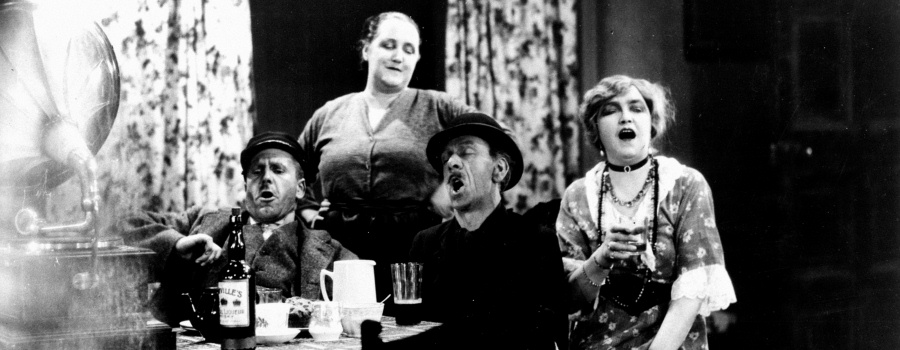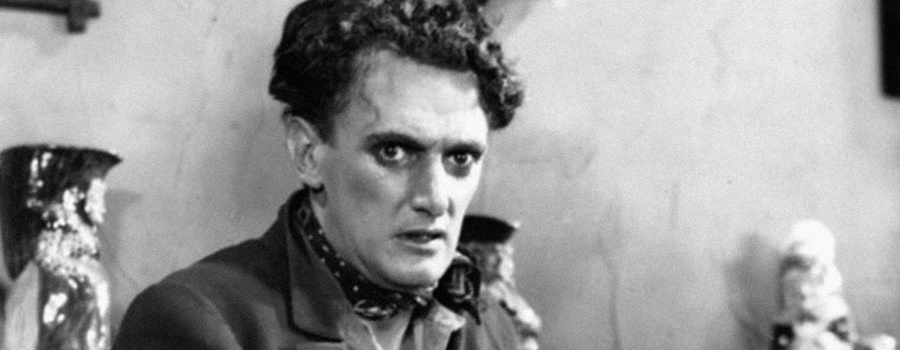Juno and the Paycock (1930)
/0001.jpg) | |
| Alfred Hitchcock | |
| John Maxwell | |
| Alfred Hitchcock | |
| Sean O'Casey (original play) | |
| Sara Allgood Edward Chapman Maire O'Neill Sidney Morgan | |
| Jack E. Cox | |
| Emile de Ruelle | |
| 97 minutes (8,751 feet) | |
| black & white | |
| mono (RCA Photophone System) | |
| 1.33:1 | |
| British International Pictures | |
| DVD | |
Synopsis
During the Irish revolution, a family earns a big inheritance. They start leading a rich life forgetting what the most important values of are. At the end, they discover they will not receive that inheritance; the family is destroyed and penniless. They must sell their home and start living like vagabonds.
Production
Sean O'Casey's play was first performed at the Abbey Theatre in Dublin in March 1924. In November the following year, The Irish Players brought Juno and the Paycock to London where it played for over 250 performances.[1][2][3]
Pre-Production
Screenplay
Although O'Casey had deep reservations about allowing his work to be filmed, Ivor Novello and Adrian Brunel persuaded him to visit Elstree Studios where he met with Hitchcock whilst he was filming Champagne. Over the following months, the two met several times and Hitchcock was not only able to secure O'Casey's approval to film Juno but also coaxed the playwright into writing a new scene for the beginning of the film.[4]
The screen adaptation, which was relatively faithful to the play, was written by Alma Reville and provided her with her first official script credit on a Hitchcock film.
Casting
The cast several actors linked to The Irish Players and the original play — Sara Allgood had played Juno in Dublin, her sister Maire O'Neill, Sidney Morgan and Kathleen O'Regan.
Principal Photography
Filming took place during November and December 1929, predominantly on a single-room set.
Hitchcock later wrote in 1937 about how the the off-screen sounds of the funeral scene were achieved:[5]
In Juno and the Paycock we wanted to get over a medley of noises: the machine guns that were firing down the street; the tinny note of a cheap gramophone playing in the room; the chatter of other people in the room; the tread-tread tramp-tramp of a funeral procession going by.
The funeral was that of a man whose death John Laurie had encompassed, and the scene was a close-up of him by the fire, and the effect these various blending noises had on him.
So we filled the studio with the noises. In one corner was a crowd of people talking in low voices; in another, half a dozen people marking time; in a third, a stagehand was beating a sofa with two canes to make the machine-gun fire.
But we couldn't get a record of the tune we needed. So the fourth corner was filled by the property man singing the tune through a megaphone. But that just sounded like a man singing, not like a cheap gramophone. So we clipped a clothes-peg on his nose.
And the scene reproduced perfectly.
Release & Reception
Whilst praising the film as "work of art; well photographed, well acted, and carrying conviction in every word and scene", The Times review noted that Hitchcock had "been so faithful to his text as almost to forget the medium in which he was working".[6]
The Manchester Guardian felt that the film wasn't as good as "Blackmail" — "There is a certain lack of imagination in the grouping and the cutting, but there are also moments of beauty ... and there are many interesting uses made of sound."[7]
A few months later, Billboard praised Allgood's performance as "one of the finest screen characterizations of the year". Their exploitation suggestions for distributors stressed the Irish angle:[8]
There is little to exploit in this production. Play up the play and the Irish Players who first presented it, laying stress upon the fact that Sara Allgood, the Mrs. Boyle of the original production, appears in the screen version. Center your advertising on the intelligentsia and your Irish clientele. This will appeal to those who like the better things in their movie fare.
See Also...
For further relevant information about this film, see also...
- 1000 Frames of Juno and the Paycock (1930)
- articles about Juno and the Paycock (1930)
- trivia
- web links to information, articles, reviews, etc
DVD Releases
released in 2006

|
L'Homme Qui en Savait Trop (1934) - Universal (France, 2006) PAL 1.33:1 [01:34:21] |
released in 2005

|
Juno and the Paycock (1930) - Waterfall Home Entertainment Ltd (UK, 2005) NTSC 1.33:1 (01:34:21)
|
Image Gallery
Images from the Hitchcock Gallery (click to view larger versions or search for all relevant images)...
Film Frames

Themes
Cast and Crew
Directed by:
- Alfred Hitchcock
- Frank Mills - assistant director
Starring:
- Barry Fitzgerald - The Orator
- Maire O'Neill - Mrs Madigan
- Edward Chapman - Captain Boyle
- Sidney Morgan - "Joxer" Daly
- Sara Allgood - Mrs Boyle ("Juno")
- John Laurie - Johnny Boyle
- Dave Morris - Jerry Devine
- Kathleen O'Regan - Mary Boyle
- John Longden - Charles Bentham
- Dennis Wyndham - The Mobilizer
- Fred Schwartz - Mr Kelly
- Donald Calthrop - Needle Nugent
Produced by:
Written by:
- Sean O'Casey - original play
- Alfred Hitchcock
- Alma Reville
Photographed by:
Edited by:
Notes & References
- ↑ English Hitchcock (2000) by Charles Barr, page 227
- ↑ Alfred Hitchcock: A Life in Darkness and Light (2003) by Patrick McGilligan, page 127
- ↑ The play initially ran at the Royalty Theatre, Soho, from 16/Nov/1925 to 05/Mar/1926, then transferred to the Fortune Theatre in London's West End from 06/Mar/1926 until 07(?)May/1926.
- ↑ Alfred Hitchcock: A Life in Darkness and Light (2003) by Patrick McGilligan, page 129
- ↑ News Chronicle (1937) - Life among the Stars
- ↑ The Times (01/Jan/1930) - Juno and the Paycock: New British talking film
- ↑ The Manchester Guardian (01/Jan/1930) - An Irish "Talkie"
- ↑ Billboard (1930) - Juno and the Paycock
| Hitchcock's Major Films | |
| 1920s | The Pleasure Garden · The Mountain Eagle · The Lodger · Downhill · Easy Virtue · The Ring · The Farmer's Wife · Champagne · The Manxman · Blackmail |
| 1930s | Juno and the Paycock · Murder! · The Skin Game · Rich and Strange · Number Seventeen · Waltzes from Vienna · The Man Who Knew Too Much · The 39 Steps · Secret Agent · Sabotage · Young and Innocent · The Lady Vanishes · Jamaica Inn |
| 1940s | Rebecca · Foreign Correspondent · Mr and Mrs Smith · Suspicion · Saboteur · Shadow of a Doubt · Lifeboat · Spellbound · Notorious · The Paradine Case · Rope · Under Capricorn |
| 1950s | Stage Fright · Strangers on a Train · I Confess · Dial M for Murder · Rear Window · To Catch a Thief · The Trouble with Harry · The Man Who Knew Too Much · The Wrong Man · Vertigo · North by Northwest |
| 1960s | Psycho · The Birds · Marnie · Torn Curtain · Topaz |
| 1970s | Frenzy · Family Plot |
| view full filmography | |



